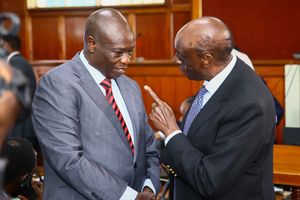Teach athletes tax law
What you need to know:
- KRA officers detained sports goods brought into the country by runners Joycilline Jepkogei and Daniel Simiu.
- Personal products brought into the country that are well above the limit of US$2,000 (Sh260,000) are dutiable.
Kenyan sportsmen and women going to represent the country in various sporting events outside the country need to acquaint themselves with how the customs department works, especially at the Jomo Kenyatta International Airport.
The move by the Kenya Revenue Authority (KRA) officers to detain sports goods, mainly running shoes brought into the country by distance runners Joycilline Jepkogei and Daniel Simiu on Tuesday raised pertinent questions on whether athletes know the customs laws.
Jepkosgei and Simiu had arrived from the Chicago Marathon where they had finished in fifth positions in their respective races on Sunday at the American city.
The East African Community Customs Management Act 2004 is clear on people that should be exempted from duty, for instance the President, diplomats and specific people with disabilities like the visually impaired.
Duty exemption
Athletes are not part of those who have been exempted from duty hence any personal goods they bring into the country that exceeds the limit, donations and gifts are all taxable.
Personal products brought into the country that are well above the limit of US$2,000 (Sh260,000) are dutiable hence KRA officers were within their jurisdiction to detain the equipment brought in by these athletes.
KRA have been kind enough to strike a partnership with Athletics Kenya (AK) where athletes intending to bring back sports equipment meant for development can communicate well in advance for duty exemption.
This is a gesture that athletes, coaches, managers and athlete managements shouldn’t abuse.
Kenya's sportsmen and women need to know that it is the duty of every Kenyans to pay tax and that even if athletes are to be issued with diplomatic passports not every athlete will be accorded that privilege.





